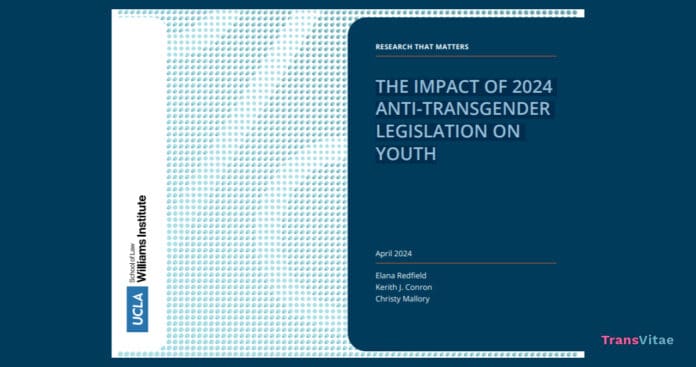Transgender teens in the United States face an increasingly difficult and hostile legal environment in a time of polarized legislation. A stark report from the Williams Institute at UCLA’s School of Law reveals that an overwhelming 93% of transgender adolescents are living under the shadow of restrictive laws, either enacted or proposed, aimed at curbing their rights. This unsettling reality casts a long shadow over the mental and physical well-being of these young individuals.
The year kicked off with Utah implementing a controversial bathroom ban, sparking widespread confusion and concern among school districts working to comply with the new regulations. Elana Redfield, the Federal Policy Director at the Williams Institute and one of the report’s authors, notes that even though the law appears “more measured,” allowing limited access to gender-appropriate restrooms under specific circumstances, its implications are no less damaging.
The debate over such discriminatory laws does not merely exist in legislative chambers; it permeates the everyday lives of transgender youth, contributing to adverse mental health outcomes. According to a survey by The Trevor Project, 86% of transgender and nonbinary youths report that their mental health has suffered due to the ongoing legislative debates around anti-trans bills.
The Williams Institute’s report also highlights the regional disparities in the enactment of these laws. For instance, an estimated 280,300 transgender youth reside in states with restrictions on gender-affirming medical care, participation in sports, and access to other sex-segregated facilities. This patchwork of policies creates a national landscape where the rights and protections for transgender youth vary dramatically from one state to another.
Kasey Suffredini, Vice President of Advocacy and Government Affairs, emphasizes the broader societal impact of these debates. “LGBTQ young people are not just spectators in these discussions—they are deeply affected by the hostile messages these debates often amplify. The negative toll on their mental health and well-being cannot be overstated,” Suffredini states.
Despite the grim outlook, there are beacons of resistance and hope. Redfield points out that several states have failed to pass restrictive measures thanks to robust opposition from local communities and activists, drawing parallels with successful fights for reproductive rights in states like Arizona and Kansas. Additionally, half of all transgender youths in the U.S. reside in 14 states and the District of Columbia that have enacted “shield” laws, protecting medical providers and parents seeking gender-affirming care for their children.
Yet, the challenges remain daunting. Approximately 200,000 transgender teens now live in states that have banned conversion therapy, a practice widely condemned by medical and psychological associations. However, 113,900 transgender youth currently reside in states that explicitly ban gender-affirming care, and another 123,600 are in states where such bans were pending as of 2024. The emotional toll is palpable: a majority of transgender and nonbinary youth report feeling angry, stressed, sad, hopeless, scared, helpless, and nervous due to these policies.
It’s crucial to recognize the resilience and courage of transgender youth and their families, who navigate these challenges daily. Kerith Conron, Research Director at the Williams Institute, underscores the importance of support systems: “A growing body of research shows that efforts to support transgender youth are associated with better mental health outcomes. These young people and their families are under more stress due to limitations on medically necessary care and full participation in school.
As the landscape of transgender rights continues to evolve, the need for informed, empathetic, and proactive advocacy remains critical. Although the battles may be difficult, the transgender community and their allies remain strong and resilient in the fight for equity and acceptance. This ongoing struggle not only highlights the disparities within American society but also underscores the vital need for solidarity, understanding, and action in the face of adversity.


